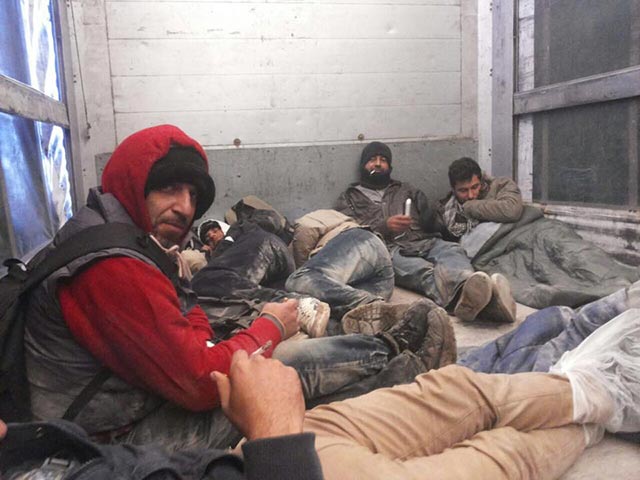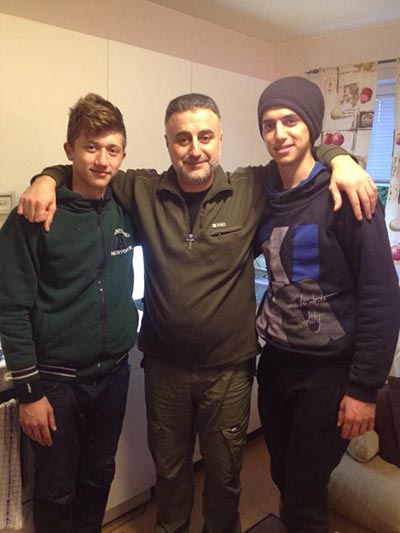My mother’s cousin Rana lived in Syria in the Palestinian camp of Yarmouk with her husband and four kids. She grew up in Lebanon, but when she met and married Malik, a Palestinian refugee living in Syria, she moved to Syria to live with him. As the situation grew worse in Syria – and as the blockade of the camp tightened, triggering many battles inside – most of the family decided to seek refuge in Lebanon, where they had relatives.
Unfortunately, Malik was unable to leave Syria since he was a government employee. If he suddenly stopped showing up, he would be considered an opponent of the regime and would never be able to return. There were also rumors that he would be denied his identification documents. Later, after he finally retired from his job, a law was passed in Lebanon prohibiting Palestinians from Syria from entering the country; today, he is still unable to unite with his family. On his son’s seventh birthday, Malik sent his little boy, Ibrahim, a greeting saying he’s sorry for not being there and for missing it for the fourth year in a row.
In Lebanon, their two sons faced a lot of difficulties in trying to complete their education since the system is very different from that in Syria; the Lebanese curriculum relies heavily on the English language, whereas most subjects are taught in Arabic in Syrian schools. Their future was starting to look dark. That was when Rana and Malik started considering unauthorized immigration. In Sweden, they believed, their sons would receive help from the government and be able to get a decent education.
“We sent our children to possible death to protect them from death, and I’m not sure how that makes sense,” Rana said, weeping as she recounted the story. “We paid money to send them to potential death!” As she told the tale, she struggled to hold back her tears.
First Leg: Lebanon to Turkey
On September 7, Malik called Rana to tell her to send Muhammad, 18, and Ahmad, 16, back to Syria so they could escape to Turkey and then to Europe with their older cousin Ahmad Abu Salim. The two went to Syria the next day, leaving behind their mother and younger brother and sister. By September 9, the teens and their cousin arrived at the Syrian-Turkish border, where they spent a night in a local house. The next day, they crossed the border by foot; Ahmad and Abu Salim crossed first; because he paused to help other travelers, it was four hours before Muhammad caught up with them. They proceeded to the town of Adana, had a bite to eat, rested, and then went to Izmir, where they were supposed to find a smuggler. They checked into a hotel there and started searching for a smuggler who could take them to Greece by rubber boat. They had been well informed by the first smuggler they dealt with in Syria on what to do at every stage.
The brothers recounted later that they felt confused, and Rana said they blew up with anger and frustration whenever they called on the phone. Nevertheless, hope for a better future fueled them with courage.
After two days, they found a smuggler and negotiated a deal. Their mother transferred the money, but the brothers withheld some until the end of their trip, to assure they reached their destination. The Turkish border guards were on their tracks, so they stayed one more night before leaving for Greece.
Second Leg: Turkey to Greece
On the following day, they left Turkey on a rubber boat carrying 20 to 25 people into the Aegean Sea. They turned off their mobile phones to preserve the batteries so they could communicate with their families. They also made sure to put all of their paper documents in plastic bags and seal them well. It took the boats around an hour and a half to leave Turkish waters and reach Greek territory. The immigrants then waited for the coast guard to notice them. When the guards motored up to the boats, they asked where the brothers and the others were headed. Muhammad answered, “to Athens, to Athens!” Usually, when people escape by sea, they destroy their rubber boats before coastal guards arrive, so they can’t be forced to go back to where they came from. But, luckily for the brothers, the Greek coast guards threw them a rope.
Their goal was to climb the mountain and find their way to a shepherd’s house described by the smuggler.
The group was taken to a Greek island called Samos. Once there, however, the brothers weren’t as lucky. At this stage, they lost contact with their parents, since the sons’ phones were taken away; the only way they could talk was through very expensive public phones on the military island. Greek officials interviewed the brothers, and within a week everyone but Ahmad had been cleared to go to Athens. Since Ahmad was underage, he wasn’t allowed to leave the island and was scheduled for placement in a foster home. Their cousin and the rest of the group left, but Muhammad refused to leave his brother behind. They contacted their parents and their father sent a legal document giving custody of Ahmad to his elder brother. They were assisted by the Palestinian council there, which hired a lawyer so that Ahmad could complete the journey.
The brothers ended up staying in Samos for about 25 days. Their mother couldn’t send them any more money, so they used their wit to make some cash. The two brothers started a small business in which they bought and resold food and other goods. Rana was amazed how collected and mature they were.
Later, they were reunited in Athens with Abu Salim, who had been unable to leave Greece after his several attempts were thwarted by the police. Muhammad and Ahmad’s father sold his car in Syria to send them money. Several smugglers tried to scam the brothers by convincing them to leave Greece by plane, which was very risky. The three of them stayed for about a month in Athens until they finally decided to leave by land to Ioannina (Yannena in Greek), on the Albanian border. They gathered with about 200 other immigrants in a forested area, where it started raining heavily and became very cold. They tried to remain low key so the Greek police wouldn’t notice them.
At that point, the smuggler was still waiting until more people came. That gave the police time to reach them and take many back to Yannena. This time, the police pulled Muhammad back, but Ahmad wasn’t grabbed. Ahmad and the others crossed the border, but after almost six hours of walking, the Albanian police nabbed them and they too were sent back to Yannena.
 Muhammad and Ahmad encountered a group of fellow men seeking freedom, covered in dust, at the shepherd’s house in Albania. (Photo: Courtesy of Fatema Dabdoub)
Muhammad and Ahmad encountered a group of fellow men seeking freedom, covered in dust, at the shepherd’s house in Albania. (Photo: Courtesy of Fatema Dabdoub)
Third Leg: Greece to Albania
Again, Muhammad and Ahmad were reunited, and their group looked for other smugglers who could bring them successfully to Albania. In a week, they found one and finally made their way into Albania. Smugglers met them in cars on the other side of the border and took them to an area known as Black Mountain.
At that point, they had no locals to guide their way, so they used the GPS on their phones. Their goal was to climb the mountain and find their way to a shepherd’s house described by the smuggler. By the time they arrived at the top of the mountain, it was nighttime. The brothers spotted a light and the three of them checked it out; sure enough, it was the house of the shepherd they were supposed to meet.
Fourth Leg: Albania to Montenegro
The next day, cars came to take them to Montenegro, with the drivers charging 550 euros per person for the trip to the capital. There, they stayed in a UN camp. Later, they contacted yet another smuggler to help them go to Serbia. The brothers got to the border separating Serbia and Montenegro and walked about three hours in the freezing snow until they reached another camp. After arriving in Belgrade, they arranged with yet another smuggler to take them to the Serbian-Hungarian border. From there, they walked until they reached an area where taxis would take them to Budapest. They were constantly warned by the smugglers not to walk together as a group and not to go into stores. On their third day there, they left for Munich, Germany.
Fifth Leg: Sweden
Finally, it was their last leg. Some of their traveling companions went to Holland, but the brothers’ destination was Sweden, where Rana’s uncle lived. They headed to Copenhagen and from there to Malmo, where their great uncle was waiting for them.
Muhammad screamed, “Mama! We’re in Sweden,” and they cried tears of joy.
Before they arrived, their great uncle had called Rana to reassure her that everything would be fine. He told her to calm down and that the next time she called him, he’d have her boys with him. Indeed, they called their mother as soon as they got to Malmo. Muhammad screamed, “Mama! We’re in Sweden,” and they cried tears of joy. For them, the future was starting to seem brighter.
 In Sweden at last! Ahmad (left), Muhammad (right) and their great uncle. (Photo: Courtesy of Fatema Dabdoub)In all, the family endured 100 days of horror, during which they put their lives in the hands of more than four smugglers. At every stage and with every setback, the brothers would call their mom and pour out their hearts to her. Rana spent her days and nights praying that God would allow her boys to finish the journey safely; she even woke from sleep crying at times. The entire journey cost the parents around $13,000.
In Sweden at last! Ahmad (left), Muhammad (right) and their great uncle. (Photo: Courtesy of Fatema Dabdoub)In all, the family endured 100 days of horror, during which they put their lives in the hands of more than four smugglers. At every stage and with every setback, the brothers would call their mom and pour out their hearts to her. Rana spent her days and nights praying that God would allow her boys to finish the journey safely; she even woke from sleep crying at times. The entire journey cost the parents around $13,000.
Rana and Malik now feel great relief that their sons are in Sweden. Ahmad is currently learning Swedish and will soon resume his high school studies. Muhammad, on the other hand, is working and making good money; he even bought a car of his own. They live together in an apartment provided by the government. They are working on obtaining their residency permits, which may enable them to bring their parents to Sweden and reunite their family. While for thousands of refugees, the trek to Europe ends unhappily, Muhammad and Ahmad have at last found safety.
Media that fights fascism
Truthout is funded almost entirely by readers — that’s why we can speak truth to power and cut against the mainstream narrative. But independent journalists at Truthout face mounting political repression under Trump.
We rely on your support to survive McCarthyist censorship. Please make a tax-deductible one-time or monthly donation.
